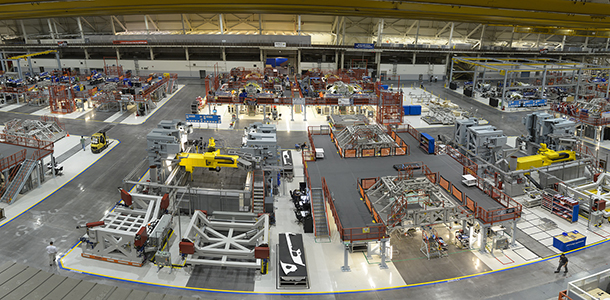
(Photo Courtesy of Northrop Grumman)
More than 15 years ago, Northrop Grumman and Antelope Valley College (AVC) began a long and successful public-private collaboration to form college curricula to better prepare the aerospace workforce of tomorrow. In February 2016, they expanded their partnership in response to an increase in manufacturing work. The latest iteration of the custom-made vocational program is on track to graduate about 115 students in its first year with plans to increase the graduate pool up to 400 per year over time.
The unique collaboration leverages the strengths of each partner, and results in qualified staff for Northrop Grumman, gainful employment for the majority of graduates and a community college program that closes the skills gap. The Strong Workforce Program and the California Community Colleges' Doing What MATTERS for Jobs and the Economy framework supports California’s economic growth and global competitiveness by investing in industry-specific partnerships, education, training and services that contribute to a highly skilled and productive workforce.
Northrop Grumman’s Orville Dothage, a manufacturing manager there, is one of the driving forces behind the creation and implementation of this innovative and ambitious program. He shares insights and inspiration for building a program that creates pathways to employment and strengthens the local economy:
How does Northrop Grumman describe the collaboration with Antelope Valley College?
The existing collaboration Northrop Grumman has with AVC is a partnership industry needs, and the charter of AVC to satisfy industry’s needs. This requires effort on both sides. Northrop Grumman has defined, advised, and in some cases, provided materials and instructors to AVC to produce a graduate that meets our entry-level technician requirements. AVC in turn creates the required course materials, facility, and instructors to produce a graduate that meets our needs for an entry-level mechanic. This relationship needs to be maintained to keep the course materials current. This is done through participation by Northrop Grumman on AVC advisory boards and foundation boards, as well as AVC’s participation in working level meetings at Northrop Grumman. This collaboration provides Northrop Grumman qualified candidates for entry-level positions, while providing AVC a constant student population that allows them to meet the needs of the community.
What were the incentives for Northrop Grumman to get involved? What are the biggest benefits for Northrop Grumman in this partnership?
Northrop Grumman is always looking for innovative ways to provide our customers with products of the highest quality that meet or exceed their requirements on schedule every time. With our continued and significant growth in the Antelope Valley, we recognized that we would need to increase the number of classes at AVC to produce more candidates to meet our entry-level technician staffing needs. AVC’s flexibility allowed them to expand the program to meet the current needs and they will be able to maintain the increased number of classes to meet the needs of the community and Northrop Grumman.
How would you compare the students who come to you from this collaboration with average applicants who have not completed the program?
Northrop Grumman only hires entry-level technicians from the AVC certificate program.
When you look forward, what do you see for this collaboration? How many potential hires do you expect to make from this program in the next year? The next 3 years?
As we continue to grow in the Antelope Valley, Northrop Grumman will continue to look for a greater numbers of graduates each year. The great thing about this program is that other manufacturing businesses and contractors are able to hire from this program, which enhances the job market in the Antelope Valley. The skills that the graduates learn qualify them for many other manufacturing positions in various local industries such as the electrical bus company, HVAC manufacturing, RV assembly and more.
What advice do you have for other corporations that may be struggling to locate and hire an adequately trained workforce?
I would highly encourage companies to work with their local community college and the local government. The city of Palmdale was key in pulling together support such as the Goodwill’s workforce and career development agency, along with support from many others from the county of Los Angeles. Palmdale and the support agencies were essential in ensuring that every class was filled to capacity and provided funding options for those students who qualified. The number of female applicants also continues to grow for this training program and more women are graduating with each cohort. This is how a community can work together to fulfill a private-sector need while providing veterans, people with disabilities, and the unemployed, with an opportunity to enter into the aerospace industry with the potential of a long-term career ahead of them.

